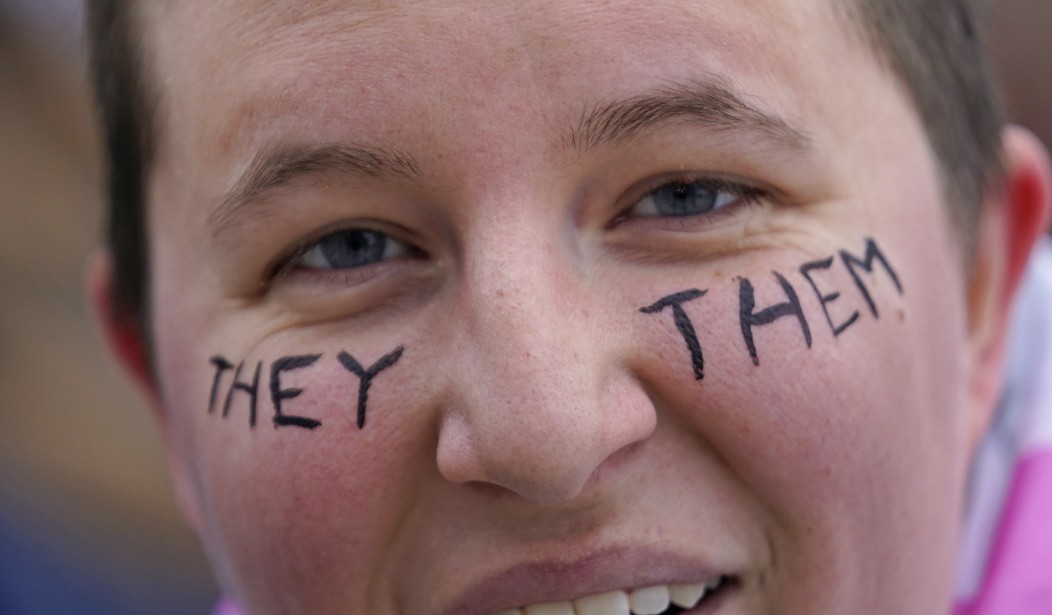Last year, Dylan Mulvaney advocated for the arrest of journalists and bloggers who referred to him using male pronouns, insisting that such actions were criminal. “The articles written about me using ‘he’ pronouns and calling me a man over and over again,” Mulvaney said. “I feel like that should be illegal. I don’t know that’s that’s just bad journalism.”
I haven't been arrested for referring to him accurately as a male and using male pronouns. But Americans are nevertheless losing their right to refer to people accurately by their biological sex. The U.S. Equal Employment Opportunity Commission has published new harassment guidelines that dictate that employers who don't use an employee's "preferred pronouns" or deny them restroom access according to their "gender identity" are engaging in harassment. The commission vote was, as you could have predicted, on partisan lines.
The new guidance elevates "gender identity" as a protected class, placing it alongside established protected classes such as race, sex, and religion within discrimination laws.
The new guidelines reads as follows.
Sex-based discrimination under Title VII includes employment discrimination based on sexual orientation or gender identity. Accordingly, sex-based harassment includes harassment based on sexual orientation or gender identity, including how that identity is expressed. Harassing conduct based on sexual orientation or gender identity includes epithets regarding sexual orientation or gender identity; physical assault due to sexual orientation or gender identity; outing (disclosure of an individual’s sexual orientation or gender identity without permission); harassing conduct because an individual does not present in a manner that would stereotypically be associated with that person’s sex; repeated and intentional use of a name or pronoun inconsistent with the individual’s known gender identity (misgendering); or the denial of access to a bathroom or other sex-segregated facility consistent with the individual’s gender identity.
A hypothetical example is included to demonstrate what kind of conduct could land you harrassment charges:
Example 15: Harassment Based on Gender Identity. Chloe, a purchase order coordinator at a retail store warehouse, is approached by her supervisor, Alton, who asks whether she was “born a man” because he had heard a rumor that “there was a transvestite in the department.” Chloe disclosed to Alton that she is transgender and asked him to keep this information confidential. After this conversation, Alton instructed Chloe to wear pants to work because a dress would be “inappropriate,” despite other purchase order coordinators being permitted to wear dresses and skirts. Alton also asks inappropriate questions about Chloe’s anatomy and sexual relationships. Further, whenever Alton is frustrated with Chloe, he misgenders her by using, with emphasis, “he/him” pronouns, sometimes in front of Chloe’s coworkers. Based on these facts, Alton’s harassing conduct toward Chloe is based on her gender identity.
According to Just the News, the new guidelines are being challenged.
EEOC Chairwoman Charlotte A. Burrows argued the changes were necessitated by the Supreme Court’s Bostock v. Clayton decision in 2020 that found that a company would be in violation of Title VII anti-discrimination laws if it fired a worker “simply for being … transgender.”
But 20 Republican state attorneys general told the EEOC last November that the agency's efforts to impose restrictions on pronouns and bathrooms were not authorized by the ruling or by any action of Congress. “Bostock gives no license to these and other of EEOC’s novel proposals," the attorneys generals wrote.
Related: Preferred Pronouns or Prison? I’ll Take Prison.
The movement to compel people to use "preferred pronouns" is hardly new, and in some cases, "misgendering" has been criminalized. In Canada and British Columbia, there have been instances of individuals facing legal repercussions for using pronouns that don't align with a person's gender identity. Students in public schools have also faced discipline for not using preferred pronouns. These efforts are designed enforce compliance with transgender ideology, and it's only a matter of time before the radical left gets its way and "misgendering" becomes a full-fledged crime in the United States — if we don't stop them first.










Join the conversation as a VIP Member